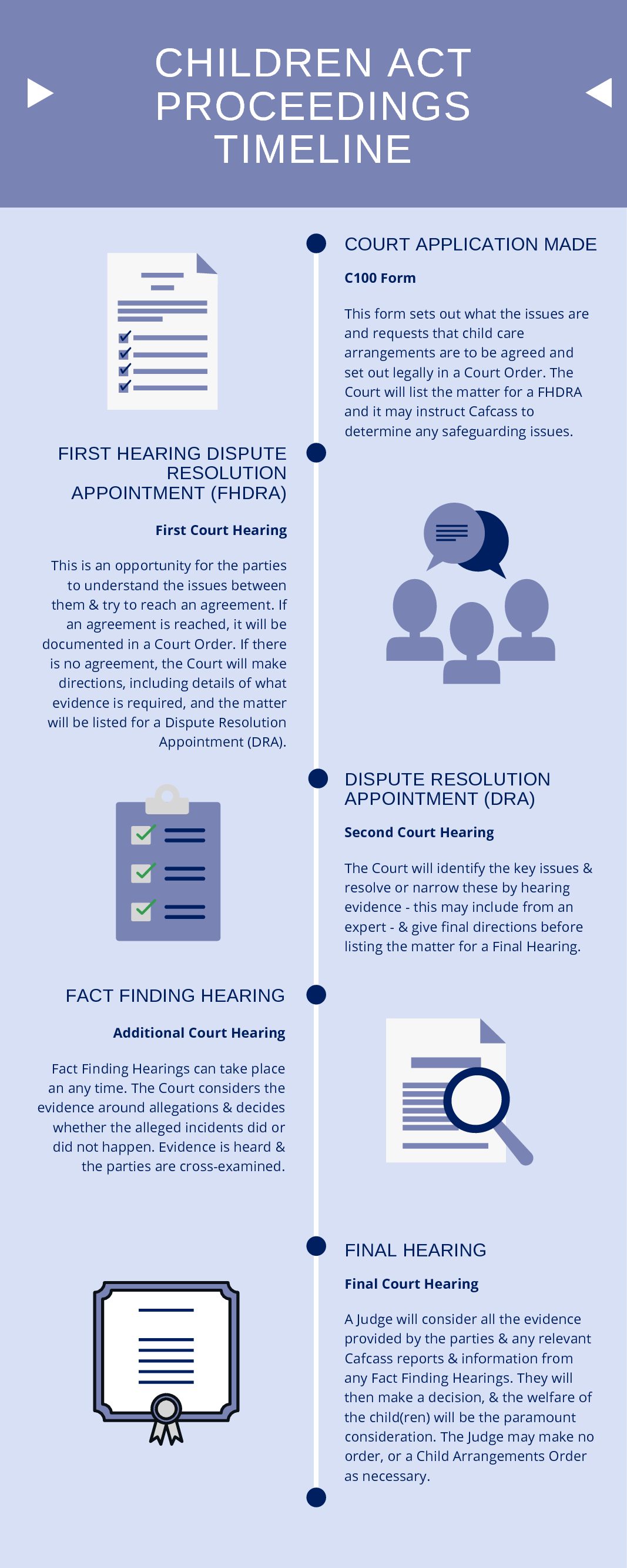If you have tried to discuss child arrangements with your ex-partner and you cannot reach an agreement, mediation is an option to consider. Mediation provides a neutral space where you can talk about your concerns and wishes and with the guidance of a trained mediator, work towards an agreement.
However, we understand that even where everyone is trying to resolve things amicably, sometimes an application to the Court needs to be made for a Child Arrangements Order. At Hawkins Family Law, our experienced family law solicitors are here to support throughout the process. We will be with you every step of the way.
We understand how daunting the court process can be, and we will work closely with you throughout the process and help with any concerns or queries you may have. We also can put you in touch with our in-house counsellor Emma Chamberlain to provide additional support.


What is a Child Arrangements Order?
A Child Arrangements Order outlines important aspects of a child’s life following a separation or divorce. Specifically, it can address:
- Where the child will live
- When the child will spend time with each parent
- When and how other forms of contact, such as phone calls, will take place
- Specific actions, such as returning the child after visits or decisions regarding schooling
- Preventive measures, like stopping one parent from taking the child away
For many parents, the goal is to achieve a shared care arrangement. This allows the child to spend a balanced amount of time with each parent, ensuring that both are actively involved in their day-to-day care. While shared care is often seen as being in the child’s best interests, practical challenges may sometimes require a more specific arrangement. In such cases, the order might need to detail the dates and times each parent spends with the child.
The ideal approach is co-parenting, where both parents collaborate to determine what is truly best for their child. The key principle is that the child’s welfare remains the central concern.
How long does a Child Arrangements Order take?
The time it takes to obtain a Child Arrangements Order can vary significantly. This depends on several factors, including the complexity of the case and any backlogs in the court system.
To help reduce delays, it’s important to work with a specialist family lawyer. They can guide you through the process, helping to avoid unnecessary time and costs. You must also attend court hearings and respond quickly when finalising arrangements for your children.
The diagram opposite shows a simplified version of the court process, and more information can be found here. Our experienced child arrangements lawyers can provide tailored advice and give you a realistic estimate of how long it may take to obtain the order based on your circumstances.
How much does a Child Arrangements Order cost?
The cost of obtaining a Child Arrangements Order can vary depending on a range of factors, including the urgency of the situation and whether additional experts – such as barristers, social workers, or psychologists – are required to support your case.
To get a clearer idea of the potential costs involved with your case, you should consult with an experienced child law solicitor. Our team can assess your specific circumstances and provide you with a tailored estimate, ensuring you have a better understanding of the cost involved in securing a Child Arrangements Order.
Why Hawkins Family Law?
We are a specialist law firm, focusing solely on family law matters, such as child arrangements and child contact. Established in 2001, the team at Hawkins Family Law are all “people” people, and are committed to producing rounded outcomes for our clients, offering expertise in whatever forum works best for you, always aiming to bring matters to a swift solution with the minimum amount of pain.
Our children specialists can provide legal advice and assistance on all child related matters which result from your separation or divorce, and can offer guidance on the ways in which you can solve your issues with your partner or ex-partner.
The way in which you resolve your child arrangement issues is your choice, but by working with our children specialists at Hawkins Family Law, you can be assured of our consistently high levels of support and guidance.
Child Arrangements FAQs
A Child Arrangements Order is a court order determining who cares for a child. Specifically, it can address: where the child will live; when the child will spend time with each parent; when and how other forms of contact, such as phone calls, will take place; specific actions, such as returning the child after visits or decisions regarding schooling; and preventive measures, like stopping one parent from taking the child away.
Child maintenance helps cover the living costs of a child or children. It is paid by one parent to the other following separation or divorce. If the amount cannot be agreed, parents can to the Child Maintenance Service (CMS) who will arrange and collect payments.
How time it takes to get a Child Arrangement Order can vary significantly depending on individual circumstances, the complexity of the case and a range of other factors.
To get a Child Arrangement Order you need a complete a C100 form. This can be downloaded from the government website or obtained from the court. The form is then submitted to the family court along with the required fee.
A Child Arrangement Order is a legally binding agreement. There are steps you can take if one parent does not comply with the agreement. You can try direct communication or mediation to attempt to resolve the issue. If this does not work and the breach is ongoing or repeated, it is important to keep detailed records and a warning letter from a solicitor will help remind the other parent of their legal obligations. You can also apply to enforce the order in court and will need a complete a form C79 enforcement application.
A Child Arrangement Order provides structure and clarity for parents and children. The order defines the agreed arrangements for a child or children’s care, including where they live and the time they spend with each parent. Helping reduce the potential for disputes and misunderstandings, the order can be enforced by the court to ensure that both parents adhere to the agreed arrangements.
A Child Arrangement Order is not the same as full custody. A Child Arrangement Order focuses on shared parenting responsibilities. Full custody, also known as sole custody, means one parent has primary legal responsibility for the child.
A Section 13 Child Arrangement Order is typically sought to prevent one parent from making significant changes to a child’s living arrangements without agreement. It means one parent will be prevented from moving the child to a different part of the UK or abroad without the consent of the other parent or the court.
Section 8 sets out who a child will live with and spend time with and other specific contact arrangements.
When a Child Arrangement Order specifies that a child lives with one parent, that parent can usually take the child on a UK holiday without the other parent’s consent. However, if the holiday includes traveling abroad, the consent of the other parent – or anyone with parental responsibility – is required.
